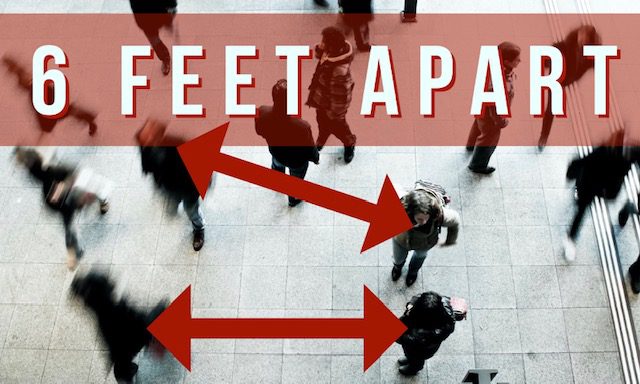
Six Feet Apart
Rewind your imagination to a pre-pandemic Sunday morning Mass at Ascension. You enter the sanctuary and see unmasked faces smiling, singing, or whispering hushed instructions to wiggling children. You feel the bustle of bodies squishing into already-full pews. You share the sign of peace with an open hand and heart. After Mass you hug a friend in the gathering area or enjoy a doughnut and a conversation in the parish hall.
If you heard the phrase “social distancing,” you probably would think it a symptom of a mental health disorder. Fast forward to the present and the behaviors that once marked our healthy and unified church community have almost disappeared. Almost, but not entirely!
United in Christ
Beyond the health and safety recommendations that physically separate us, there is also a growing myriad of socio-political ideologies that emotionally and spiritually separate us. It likely goes without saying that division is not one of the four essential features of our Church; unity is (CCC 811)! Yet, the threat to Christian unity is not new. Unity in Christ (along with fiery exhortation to the early Church for petty and divisive bickering) is a prominent theme in the Epistles of St. Paul — ideas that are as applicable to the Church now as the Church then.
To the Church at Philippi, St. Paul instructs, “If you have any encouragement in Christ, if any comfort from His love, if any fellowship with the Spirit, if any affection and compassion, then make my joy complete by being of one mind, having the same love, being united in spirit and purpose” (2:1-2). St. Paul expands upon the concept of Christian unity in his letter to the Romans, “So we, though many, are one body in Christ” (12:5). To the Church at Ephesus he preaches, “Make every effort to keep yourselves united in the Spirit, binding yourselves together with peace” (4:3).
Using the Gift
If unity (or oneness) is one of the four essential features of our Church, then why do we experience division? The Catechism explains that the Church has always been marked by great diversity, and “the great richness of such diversity is not opposed to the Church’s unity. Sin and the burden of its consequences constantly threaten the gift of unity” (814). Simply put, we are not divided by our differences, but by sin. Unity is a great gift given to our Church, but it is a gift that we must utilize and maintain. “Christ always gives his Church the gift of unity, but the Church must always pray and work to maintain, reinforce, and perfect the unity that Christ wills for her” (CCC 820).
Love Binds
Repeat the imagination rewind exercise in the first paragraph, noting the changes in outward signs of unity in our pre– and post-pandemic parish. Add the growing polarization of political ideologies to the physical distance requirements, and the entire scene becomes very discouraging. But, as in all things, sin does not have the final word; Christ does.
Though we may be separated by six feet of distance and face masks, though we may draw differing conclusions to various political problems, we partake in the highest expression of unity when we share in the Eucharistic meal. “Christ’s sacrifice present on the altar makes it possible for all generations of Christians to be united with his offering” (CCC 1368). In the Eucharist, “the whole church is united with the offering and intercession of Christ” (CCC 1369).
This Sunday, as you prepare your heart to receive Jesus in the Blessed Sacrament, look beyond the “me” to the “we” of our (and every!) parish community. Lay down your life with Christ, and pick up the unique charisms of your particular call. Look to your left and right, appreciating the unique gifts that each person brings to this shared sacrifice. After all, the Eucharist is the Sacrament of love, and love binds. “clothe yourselves with love, which binds us all together in perfect harmony” (Col. 3:14).





